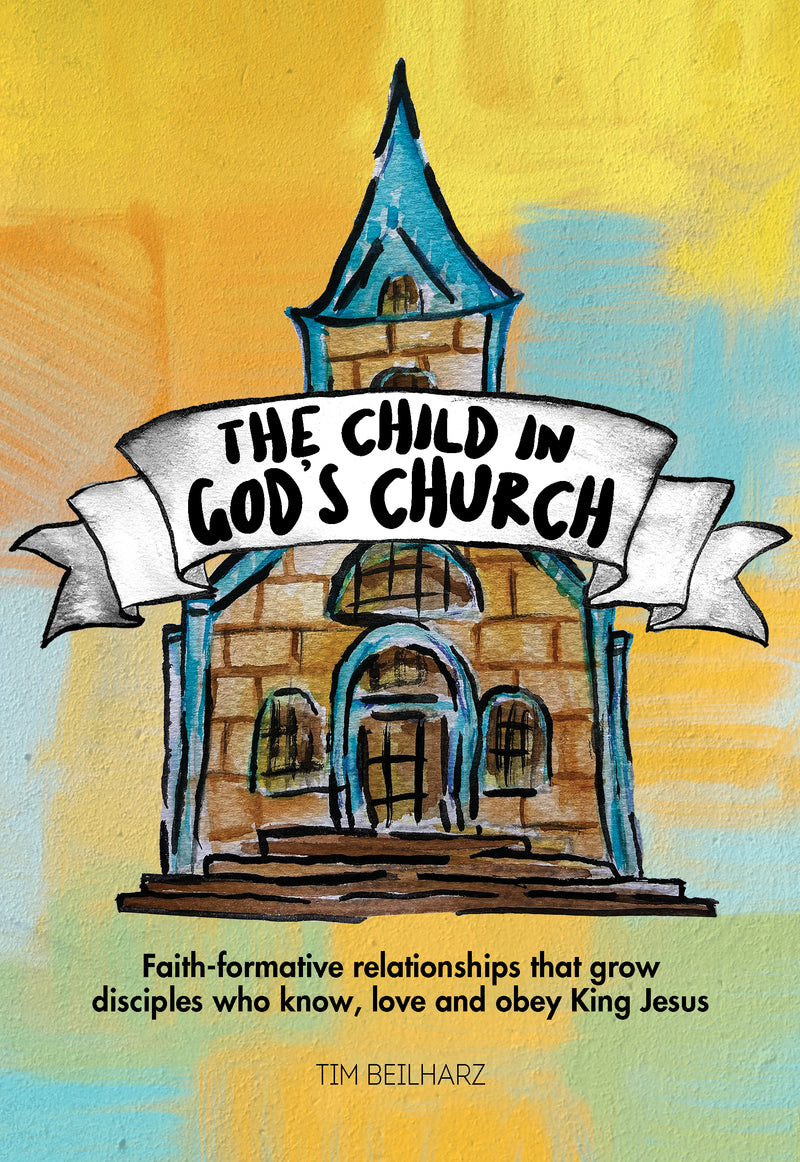
‘Kingdom kids’: thinking theologically about children
A biblical framework for parents and churches.
The purpose of this article is to investigate what the Bible has to say about children, specifically their membership in the kingdom of God. This understanding profoundly impacts how we, as parents and church communities, nurture their relationship with Jesus their Saviour. Throughout this article, I’ll refer to children as members of God’s eternal kingdom: as ‘kingdom kids’.
While children are mentioned throughout Scripture, God hasn’t neatly bundled his thoughts on their salvation and kingdom membership into one passage. Therefore, I’ll reference a variety of Old and New Testament Scriptures. My aim is to construct a theological framework for thinking about children that’s consistent with God’s revealed character and his gospel of grace through Jesus.
The foundation of salvation: grace through faith alone
Before we dive into children specifically, it’s crucial to lay the foundation of our evangelical understanding of Christian salvation. Entrance into God’s eternal kingdom is solely by God’s grace, received through faith in Jesus Christ’s atoning death on the cross for sin and his victorious resurrection (Romans 3:23–26; Ephesians 2:8–9). All humanity stands condemned under God’s righteous judgement due to sin (Romans 3:9–18). It’s only by God’s merciful provision of Jesus as an atoning sacrifice for our sin that we’re granted undeserved life and a relationship with him. Those gifted this faith are sealed with the Holy Spirit (Ephesians 4:30).
We’re all fearfully and wonderfully made in God’s image (Psalm 139:13–16; Genesis 1:27). However, even newborn children, who haven’t yet committed conscious, rebellious acts, aren’t exempt from humanity’s fallen state; all humanity has inherited a sinful nature from Adam and Eve’s original trespass (Romans 5:12–17). This inherited sin underscores the profound wonder of Jesus’ grace:
For if, by the trespass of the one man, death reigned through that one man, how much more will those who receive God’s abundant provision of grace and of the gift of righteousness reign in life through the one man, Jesus Christ! (Romans 5:17)
Crucially, there’s no ‘free pass’ into God’s kingdom for children, or for anyone else. Parental effort, prayers or formulas can’t guarantee a child’s kingdom membership. It’s by grace alone, through faith alone, that any of us—including children—receive this privileged status. This truth, however, doesn’t diminish the immense responsibility of parents and primary caregivers. Just as church leaders will give an account for those they oversee (Hebrews 13:17), so too will parents give an account for pointing their children to Jesus, their true Saviour.
God’s consistent heart for children: old and new covenants
Scripture consistently reveals God’s yearning for children to know him and his commandments (Deuteronomy 4:9; 6:4–9), and to understand his saving acts (Joshua 4:1–7). A key aspect of this is children’s inclusion in God’s covenants. Under the old covenant, children were part of the Israelite nation through the covenant of promise and circumcision (Genesis 12:1–3; 17:9–14).
With Jesus, a new covenant was inaugurated, replacing the old (Hebrews 10:9). Significantly, the Gospels of Matthew, Mark and Luke all record Jesus’ explicit command: ‘Let the little children come to me’. This consistently demonstrates God and Jesus’ desire for children to know him and, having been gifted with faith, trust in Jesus as Lord and Saviour—thereby becoming ‘kingdom kids’.
When do we consider a child a ‘kingdom kid’?
This leads us to the central question: At what point should we consider a child a ‘kingdom kid’? Is it from birth, or only when they can consciously verbalise and ‘declare with [their] mouth, “Jesus is Lord” and believe in [their] heart that God raised him from the dead’, thereby being ‘saved’? (Romans 10:9–10). If it is from birth, does this apply to every child or specifically to those with believing parents?
Children who profess faith
Scripture affirms that children can indeed possess genuine faith. Paul noted that Timothy knew the Holy Scriptures ‘from infancy’, making him ‘wise for salvation through faith in Christ Jesus’ (2 Timothy 3:15). This was undoubtedly fostered by the sincere faith of his grandmother Lois and mother Eunice (2 Timothy 1:5). It’s reasonable to imagine there was a family priority of passing the gospel to Timothy from a very young age.
We observe that young children can and do declare the gospel with their lips, often with a sincerity of heart moved by the Spirit, not merely parroting what they’ve heard. In our church community, we have the encouragement of witnessing similar spirit-filled joy in adults with limited cognitive abilities—strong evidence that God’s work of salvation extends beyond chronological age or cognitive function. We should be hesitant to assume limits of any sort on our Triune God.
A common concern arises: ‘Surely kingdom kids would be “good” kids, wouldn’t they?’ Any parent knows that even children who make genuine declarations of faith can still be ‘naughty’. This reflects the ongoing struggle with sinful desires and temptations that all Christians face, regardless of age. Children praising King Jesus one minute may display attitudes contrary to the gospel the next. Such actions don’t automatically negate their salvation. If we judged anyone’s salvation by their actions, we would have forgotten the cross entirely. Just as adult Christians need to be continually pointed back to Jesus, so do children, time and time again, so that grace abounds in our homes and church communities.
The genuineness of a child’s declarations—whether copying others or truly Spirit-prompted—will become evident over time by the ‘fruit of the Spirit’ in their lives (Galatians 5:22–23). Therefore, while children are declaring Jesus as King, it seems right to consider them ‘kingdom kids’, while still diligently discipling them to a deepening understanding of the gospel and obedience to God’s commands.
Children of believing parents: covenant membership
What about children so young they can’t speak or consciously articulate faith? Newborn babies have little control or conscious awareness. They may seem to have done ‘nothing wrong’ to deserve God’s wrath, leading some to assume they are all ‘kingdom kids’. However, we must ground our understanding in God’s revealed word. Let’s first consider children born into households with believing parents.
Old covenant parallel: In the Old Testament, children born into an Israelite family were inherently part of the Israelite nation, included as God’s chosen people and recipients of the old covenant’s blessings. Joshua’s declaration, ‘as for me and my household, we will serve the Lord’ (Joshua 24:15), encompassed his children. For boys, circumcision at eight days old served as a sign of the covenant (Genesis 17:12).
New covenant continuity: Similarly, in the New Testament, when entire households came under the new covenant of grace, whole households were baptised and considered members of God’s kingdom (Acts 16:33–35; John 4:43–54). Paul’s teaching in 1 Corinthians further supports this:
For the unbelieving husband has been sanctified through his wife, and the unbelieving wife has been sanctified through her believing husband. Otherwise your children would be unclean, but as it is, they are holy. (1 Corinthians 7:14)
This suggests a corporate, covenantal holiness (that is, being set apart for God) that includes children within a believing household, even if only one parent believes.
Given this scriptural pattern, it seems consistent to consider children born into households with believing parents as ‘kingdom kids’ from birth. We understand this as a covenantal presumption of membership, which requires ongoing nurture and a future individual embrace of faith.
Parental and church responsibilities for covenant children
In both Old and New Testament contexts, our role as biological, step or adoptive parents, and as a church family, is profound. We are commanded to ‘fan into flame the gift of God’ (2 Timothy 1:6) in these children. This means:
- helping them know their heavenly Father
- showing them God’s plan of redemption through Jesus
- guiding them to live with Jesus as their King through prayerful dependence and obedience.
We must always remember that forgiveness and kingdom membership for any of us come only through repentance and the grace of Jesus. Just as parents cultivate a child prodigy’s potential by surrounding them with opportunities, so too should we immerse our ‘kingdom kids’ in Scripture, knowing they have the Holy Spirit to teach them all things and remind them of Jesus’ work (John 14:26), surround them with Christian brothers and sisters, and provide every opportunity to grasp their eternal reality.
This is the wonderful privilege and responsibility given to parents and church families, promising a joy that far surpasses any earthly achievement—one that will resonate through eternity.
A longer version of this article originally appeared at Hunter Bible Church and has been republished with permission.
---
Andrew is married to Kim and is dad to three sons. He has been leading the ministries to Youth and Kids on team at Hunter Bible Church, Newcastle since 2011.

The Child in God's Church
The author provides the biblical reasons for including and nurturing children as precious members of the body of Christ. He sets the theological and theoretical foundations for understanding children and the church, then provides a framework for practising children’s ministry in the local church.
For more articles from Growing Faith, subscribe to our monthly e-newsletter.
To hear about the latest books and resources from Youthworks Media, subscribe here.








